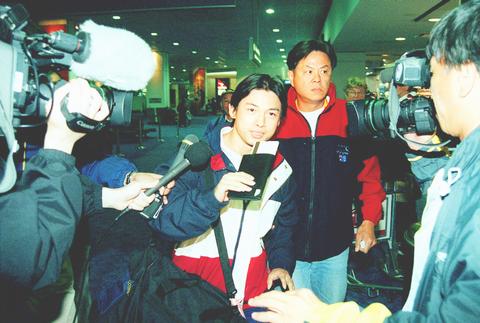Taiwan's Olympic team was dealt another serious blow yesterday when a third member of its weightlifting team was barred from competition, further dashing hopes that the island will bring home a gold for the first time in its history.
Yesterday, as hundreds of spectators were converging on Australia's port city of Sydney and the festive spirit of the Games was building, Chen Po-pu (陳柏甫), 23, was being ushered onto a plane and back to Taiwan.
Chang Chao-kuo (張朝國), the head of Taiwan's weightlifting federation, said after hearing of the ban: "I feel so ashamed. All our athletes will now be suspect and this will have a negative impact on the Taiwan team."

PHOTO: REUTERS
Speaking through a press release, Taiwan's Olympic delegation said that the International Weightlifting Federation (IWF) had requested that Chen, one of Taiwan's top three male competitors, be banned from competition for two years and barred from participating in the Sydney Olympics.
Chen is the third weightlifter from Taiwan to be barred from participating in the Olympics in a little over a week. On Sept. 5 Chen Jui-lien (陳瑞蓮) and Wu Mei-yi (吳美儀) were also barred from the Games.
All three weightlifters tested positive for muscle building and performance enhancing anabolic steroids.
Chen, who took silver and bronze medals at world junior competitions in 1997 and 1998, was on the reserve list to compete in the 62kg category in Sydney.
At a training session yesterday, a coach with the team said Chen's drug use was baffling since he was not scheduled to compete.
"He had no reason to take any drugs because he wasn't on the formal list of competitors. He was on the reserve list," said the coach, who declined to be identified.
Chen Po-pu first tested positive for steroids in March of this year after he set a new national record for the 63kg category, lifting 130kg in the snatch competition.
Chen said that he was using the drug for treatment of a shoulder injury, which doctors at Tzu Chi hospital in Hualien where he received the treatment have verified.
Chen's father, Chen Chi-jung (陳啟榮), also petitioned against the decision to Taiwan's Weightlifting Association arguing that the IWF standards say that athletes who are being treated for injury can refuse doping tests.
The elder Chen said that the amount of the drug in his son's system may have exceeded international standards, but the drug was not being used illegally.
Chen was barred at that time from competition until an Aug. 18 decision by Taiwan's weightlifting federation overturned a similar ruling against two gold-medal hopefuls, Chen Jui-lien and Wu Mei-yi, allowing them to join Taiwan's Olympic team.
With Chen and Wu allowed to compete, the ban against Chen Po-pu was also lifted on the grounds that the athletes were using the drugs for treatment, not to enhance performance.
However, Chen and Wu had also been found to have performance enhancing drugs that exceeded normal levels in their blood. Chen Jui-lien was using drugs to treat a chronic knee problem. In Wu's case, weightlifting officials have questioned the validity of the testing.
According to IWF regulations, countries who have three athletes found to be using banned performance-enhanced drugs will be fined US$50,000.

SECURITY: As China is ‘reshaping’ Hong Kong’s population, Taiwan must raise the eligibility threshold for applications from Hong Kongers, Chiu Chui-cheng said When Hong Kong and Macau citizens apply for residency in Taiwan, it would be under a new category that includes a “national security observation period,” Mainland Affairs Council (MAC) Minister Chiu Chui-cheng (邱垂正) said yesterday. President William Lai (賴清德) on March 13 announced 17 strategies to counter China’s aggression toward Taiwan, including incorporating national security considerations into the review process for residency applications from Hong Kong and Macau citizens. The situation in Hong Kong is constantly changing, Chiu said to media yesterday on the sidelines of the Taipei Technology Run hosted by the Taipei Neihu Technology Park Development Association. With

A US Marine Corps regiment equipped with Naval Strike Missiles (NSM) is set to participate in the upcoming Balikatan 25 exercise in the Luzon Strait, marking the system’s first-ever deployment in the Philippines. US and Philippine officials have separately confirmed that the Navy Marine Expeditionary Ship Interdiction System (NMESIS) — the mobile launch platform for the Naval Strike Missile — would take part in the joint exercise. The missiles are being deployed to “a strategic first island chain chokepoint” in the waters between Taiwan proper and the Philippines, US-based Naval News reported. “The Luzon Strait and Bashi Channel represent a critical access

CARROT AND STICK: While unrelenting in its military threats, China attracted nearly 40,000 Taiwanese to over 400 business events last year Nearly 40,000 Taiwanese last year joined industry events in China, such as conferences and trade fairs, supported by the Chinese government, a study showed yesterday, as Beijing ramps up a charm offensive toward Taipei alongside military pressure. China has long taken a carrot-and-stick approach to Taiwan, threatening it with the prospect of military action while reaching out to those it believes are amenable to Beijing’s point of view. Taiwanese security officials are wary of what they see as Beijing’s influence campaigns to sway public opinion after Taipei and Beijing gradually resumed travel links halted by the COVID-19 pandemic, but the scale of

Pope Francis is be laid to rest on Saturday after lying in state for three days in St Peter’s Basilica, where the faithful are expected to flock to pay their respects to history’s first Latin American pontiff. The cardinals met yesterday in the Vatican’s synod hall to chart the next steps before a conclave begins to choose Francis’ successor, as condolences poured in from around the world. According to current norms, the conclave must begin between May 5 and 10. The cardinals set the funeral for Saturday at 10am in St Peter’s Square, to be celebrated by the dean of the College